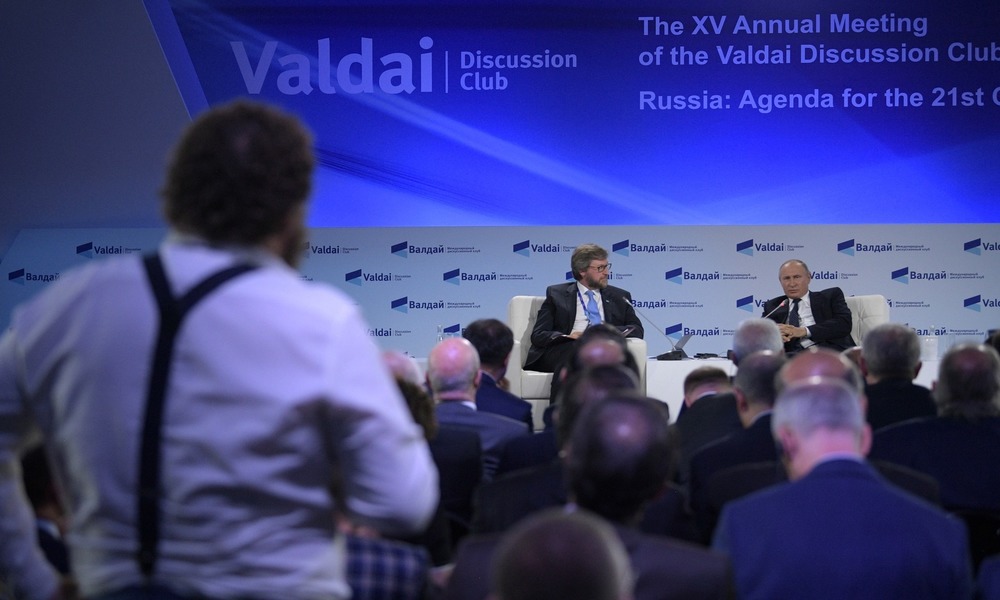RUSSIA MONITOR
Date: 20 October 2018
Putin Again on the Warpath
During the recent plenary session of the Valdai Discussion Club, Russia’s President Vladimir Putin confirmed that the Kremlin would return to its hitherto confrontational political course. The leader’s extremely aggressive statements seem to fit into all declarations and actions made and carried out by Russia over the last few weeks. Such “combat” attitudes stem from further escalation of the conflict with Western countries over activities of Russian military intelligence services as well as a stalemate in Israeli-Russian diplomatic relations following the downing of a Russian aircraft in Syria. Putin’s performance at the Valdai Discussion Club resembled his presidential address delivered in March 2018; in both speeches, the leader kept attacking everyone and threatening them with a potential war.

According to the previous predictions of the Warsaw Institute, Putin’s failed attempts to reset U.S.-Russian relations, taken at the very beginning of his new term of office, prompted the president to return to his somewhat traditional “war” policy. The Kremlin seeks to stiffen its relations towards the West, as evidenced by Putin’s comment on Sergei Skripal (October 3, 2018). First, the Kremlin has long avoided commenting on this matter while secondly, such words came during the plenary session of the energy forum in Moscow, thus in rather unexpected circumstances. Putin called the former GRU officer, condemned for prison but legally pardoned and released from Russia, a “scumbag” and “traitor to the motherland”.
Only two weeks later, on September 18, on the occasion of the Valdai Discussion Club – an international forum that brings together former Russian politicians, journalists, political scientists and economists – Putin attacked the United States, accusing the Americans of making problems, which results directly from some internal struggles in Washington. This only corroborates the fact that the Kremlin already ceased ton count on any diplomatic breakthrough in relations with Trump’s United States. Thus, facing such state of matters, America returns to its position of Russia’s great military enemy. Like in the above-mentioned federal address back in March this year, Putin bragged about the state’s modern military equipment. He also assured that his country was not afraid of anything and anyone, raising the question of a possible nuclear war. In this respect, President’s words sounded extremely sharp as he announced that “any aggressor should know that retaliation is inevitable”, adding that “we as the victims of an aggression, we as martyrs would go to paradise while they will simply perish because they won’t even have time to repent their sins.”
Yet another clear message was sent to the Israeli authorities. Putin overtly announced that any countries wishing to push Iranian forces out of Syria should first and foremost guarantee that they would no longer interfere in Syria’s internal affairs. With such a message, the Russian leader clearly accepts the regime of President Bashar al-Assad. Putin pointed out that in order for Syria to abandon the services of its allies, the conditions for safe development should prevail in this country. Such message constituted a warning for Europe – especially Germany – to invest money in rebuilding embattled infrastructure in the Assad-ruled Syria. The agreement on withdrawal of Iranian troops shall be within the competence of both Damascus and Tehran while Putin’s statement means that the Israelis should not really count on Russian help in this respect. Such decision does not seem surprising in the light of a sharp deterioration in Moscow-Jerusalem relations following the shooting down of a Russian aircraft in Syria; such incident was provoked by al-Assad’s army, however while Israel was assumed to play the role of a scapegoat. Last but not least, during Putin’s meeting with members of the Valdai Discussion Club, the leader admitted that – pursuant to the 2014 Crimean referendum, considered as non-valid by both Ukraine and the West – the peninsula remains part of the Russian Federation. Nonetheless, in this case, there is no room for any further talks as Russia will not be eager to make any concessions, even in the light of potential restrictions.
All texts published by the Warsaw Institute Foundation may be disseminated on the condition that their origin is credited. Images may not be used without permission.














